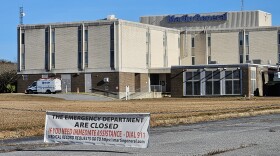Months after a new health care price transparency rule went into effect, some North Carolina hospitals failed to show full compliance. Now, nearly a full year under the new rule, leaders from those hospitals say they are fully following the policy, but regulators have not publicly released information to show these hospitals are indeed in good standing.
Beginning in January, hospitals have been required to post detailed price information for hundreds of services. The information must break pricing down by health insurance carrier, something both health care and insurance providers have for years been reluctant to disclose.
The rule was written during former President Donald Trump's administration and affirmed by President Joe Biden, one of the few policy items with broad support from both presidents. Advocates for lower health care costs have praised the rule, saying it will bring much-needed transparency to the opaque world of health care billing.
However, hospitals across North Carolina have fallen short of meeting the policy. Between May 18 and August 25, the Centers for Medicare and Medicaid Services sent violation notices to at least eight hospitals and health systems in the state.
Those receiving notices were:
- Atrium Health University, Charlotte
- Cone Health Wesley Long Hospital, Greensboro
- J. Arthur Dosher Memorial Hospital, Southport
- Mission Hospital, Asheville
- Novant Health Presbyterian Medical Center, Charlotte
- Novant Health Huntersville Medical Center, Huntersville
- University of North Carolina Hospitals, Chapel Hill
- WakeMed Hospital, Raleigh
These violation notices were not posted online. WUNC obtained the violation list through a Freedom of Information Act request submitted in August and obtained this month. WUNC has requested information as to any changes in compliance status, but had not received an answer by publication time.
Separate from the Centers for Medicare and Medicaid Services, N.C. Attorney General Josh Stein in September also sent notices to 40 hospitals throughout the state, reminding them to make sure their billing departments meet the policy rules. WUNC received those notices through a separate FOIA. These records are reported in detail here for the first time.
WUNC and WFAE reached out to all 40 hospitals that received non-compliance notices, a number that represents about one-third of the total hospitals in the state. Most said they have since made changes to the way they post their data, and are now in compliance with the federal law.
“We had a conversation with the AG’s office to show that WakeMed was/is compliant – and we received word from CMS that we are completely compliant,” Raleigh-based WakeMed Health spokeswoman Kristin Kelly wrote in an email to WUNC. “Our machine-readable list of items and services is functional. We have added an online estimator tool to go alongside our WakeMed Estimates [phone] line.”
Price data must be machine-readable
WUNC and WFAE examined some of the hospital price transparency websites for hospitals across the state. In some cases, it appears that the changes made bring these hospitals into compliance. In other cases, however, at least some of the requirements do not appear to have been met.

This is true most frequently as it relates to a requirement that the data be machine-readable, meaning a user can download the full dataset to import into a software program. While this function might not be something that consumers directly use often, it could end up as one of the most important factors in helping consumers on the back end. That’s because by making the files machine-readable, health pricing transparency advocates can download data for hospitals across the state or country and put the information into one software program that could then do a better job of price comparisons across cities, states, and regions.
In short: It's what will allow consumer advocates to build consumer-friendly price comparison tools.
It also helps drive competition, said Nisha Kurani, a senior health policy analyst with the Kaiser Family Foundation.
“Price data available through machine-readable files can be used by hospitals and insurers to better negotiate prices,” she wrote in an email. “Third parties could use price information provided by hospitals to create tools for patients to shop for lower-priced care, but that data would have to be in a format that is easy to use.”
An April Kaiser Family Foundation analysis of price transparency data found “limited compliance” with the new rule, and even where compliance was met, “the lack of data standardization makes it difficult to compare prices across facilities,” according to that report.
Compliance has improved since January 1
This isn’t to say hospitals have done nothing. Indeed some hospitals were fully compliant beginning Jan. 1, and most hospitals have made efforts to improve the data they share.
Charlotte-based Atrium, which received a non-compliance letter from CMS, responded to the regulator that its systems are in compliance.
In an email to WFAE, Atrium spokesman Daniel Fogleman wrote, “While there is widespread non-compliance throughout the industry, our teams at Atrium Health and Atrium Health Wake Forest Baptist were diligent in studying the rules and assembling the data in a manner that is compliant. Our goal was and continues to be that our machine-readable files meet the federal requirements and we are confident that they do.”
Atrium’s website includes a cost estimator, which visitors can access by clicking on the “Financial Assistance and Standard Charges” link at the bottom of the homepage and then another link labeled “Financial Information.”
Novant Health, based in Winston-Salem, also offers a cost estimator tool on its website and a list of standard charges. Novant spokesperson Megan Rivers said in an email that the standard charges list provided by most hospitals “does not have utility for consumers or patients.” Rivers said the charge list is “extremely cumbersome and difficult to search if you do not have knowledge of specific insurance coding or negotiated payor rates” and recommended prospective patients use the cost estimate tool instead.
Consumers largely still not aware of new rule
A Kaiser Family Foundation poll found that consumers largely are not aware of the new price transparency rule. Just 9% of poll respondents said they knew hospitals had to post detailed price information.
The Attorney General's office has indicated its intent to follow up with hospitals to see if changes they've made bring them in full compliance, but has not finalized those checks.
“Our office continues to work to bring health care systems and hospitals into compliance with price transparency regulations,” wrote Laura Brewer, the deputy chief of staff for Stein. “Attorney General Stein is encouraged by the progress the hospitals are making because he knows that North Carolinians need accurate information about health care costs to shop around and make informed choices.”
While sensitive to the notion that hospitals have been extraordinarily busy this year, Stein in an earlier interview said they should still be able to meet these new rules.
"These federal pricing regulations have been in the hopper for some time now, so the hospitals have known these requirements were coming," Stein said. "Of course, they've been slammed by COVID. And we are all so incredibly appreciative of the interminable work that health care providers are having to deliver to save people's lives. But there's no reason why hospital administrators, who have known this work is due, can't get that work done.”
WUNC's Caitlin Leggett contributed to this report.







